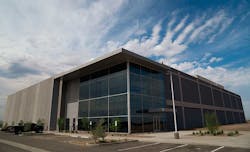EdgeCore Digital Infrastructure Shifts into Building Mode Across the U.S.
EdgeCore Digital Infrastructure is shifting into construction mode across its network of digital real estate. Four months after being acquired by Partners Group, EdgeCore says it is positioned to make an impact in the U.S. data center market.
"We have power and land in the key markets," said Jeff Dorr, President and Chief Financial Officer and a co-founder of EdgeCore. "We can get close to 500 megawatts of capacity out of our existing campuses. We think we're really well positioned to capture some market share. here over the next couple of years."
EdgeCore operates data center campuses in the Northern Virginia and Greater Phoenix markets, and recently commenced construction on a site in Silicon Valley. It also owns a development site in Reno, Nevada as well as a second property in Loudoun County, Virginia.
In November EdgeCore was acquired for $1.2 billion by Partners Group, which promised to fund development of existing data center sites and potentially new markets.
"We're in the right markets with the right locations, and the sites are well positioned for scale," said Dorr.
Shifting Investment Strategy in a Changing Market
EdgeCore Digital Infrastructure launched in 2018 with an experienced management team led by former CoreSite CEO Tom Ray and plans to build huge campuses in leading data center markets. After completing its initial data center in Mesa in 2019, the company built a data center campus in Sterling in Northern Virginia. EdgeCore has focused primarily on a build-to-suit strategy, seeking to identify tenants for a project before investing heavily in development.
EdgeCore has moved at a deliberate pace in a market where other new platforms have grown rapidly. Dorr noted the large influx of capita lin 2019-20 as investors announced new operating platforms. Dorr said EdgeCore was cautious about building projects on speculation (without a tenant commitment) at that time, given the potential that new platforms might flood key markets with new data center inventory.
The COVID-19 pandemic created a surge in demand, along with supply chain challenges. As development timelines became extended, it required new thinking on executing timely built-to-suit deals.
"We're in the right markets with the right locations, and the sites are well positioned for scale," said Dorr. "But we need to actually go build the substations and get everything ready to serve the customer. That's gotten more challenging in the last couple of years with supply chain issues. That's what led us to go down the path of finding a new partner, and we're super excited about the Partners Group acquisition . They acquired the existing assets and will infuse the company with additional capital to go to go build."
That has allowed EdgeCore to begin construction on its Santa Clara and Reno campuses. "Right now we're in the in the process of finalizing the all horizontal construction, doing grading, getting pads ready, and building the substations," said Dorr. "Substations are being built right now in in Santa Clara and Reno and we're in the queue at our new Virginia campus.
"We definitely understood that you have to make these investments to position yourself to be ready for the demand when it comes," said Dorr. "We're making all those investments right now."
EdgeCore has also acquired an additional land for its campus in Mesa, buying 15 acres of property from Meta, which owns nearly 400 acres where it plans to build a new campus. EdgeCore plans up to seven data centers on its Phoenix campus, which will eventually span 1.25 million square feet of space.
Santa Clara Provides Opportunity
The recent start of construction in Santa Clara represents an opportunity to bring new capacity to a supply-constrained market. Santa Clara is the most desired location in Silicon Valley for data center development due to lower power pricing costs from the municipal utility, Silicon Valley Power. Santa Clara also tends to have a lengthy road to market due to the scarcity of land and power and the extended permitting process.
In recent years, Silicon Valley Power and local officials have been applying more scrutiny to new power requests from data centers, which may require the utility to expand its infrastructure.
As a result, Dorr says the four-year wait since the project was announced provides a benefit. "We signed the substation agreement back in 2020, before the (power capacity) constraints fully became realized in that market, so we have a fantastic substation agreements."
The new Silicon Valley campus will support 72 MW of critical load across 540,000 square feet of space. Utility power will be available at the site through Silicon Valley Power beginning in early 2024.
About the Author



